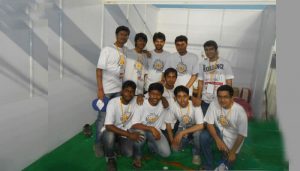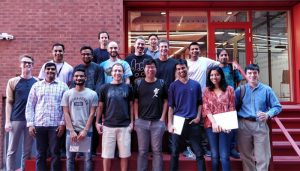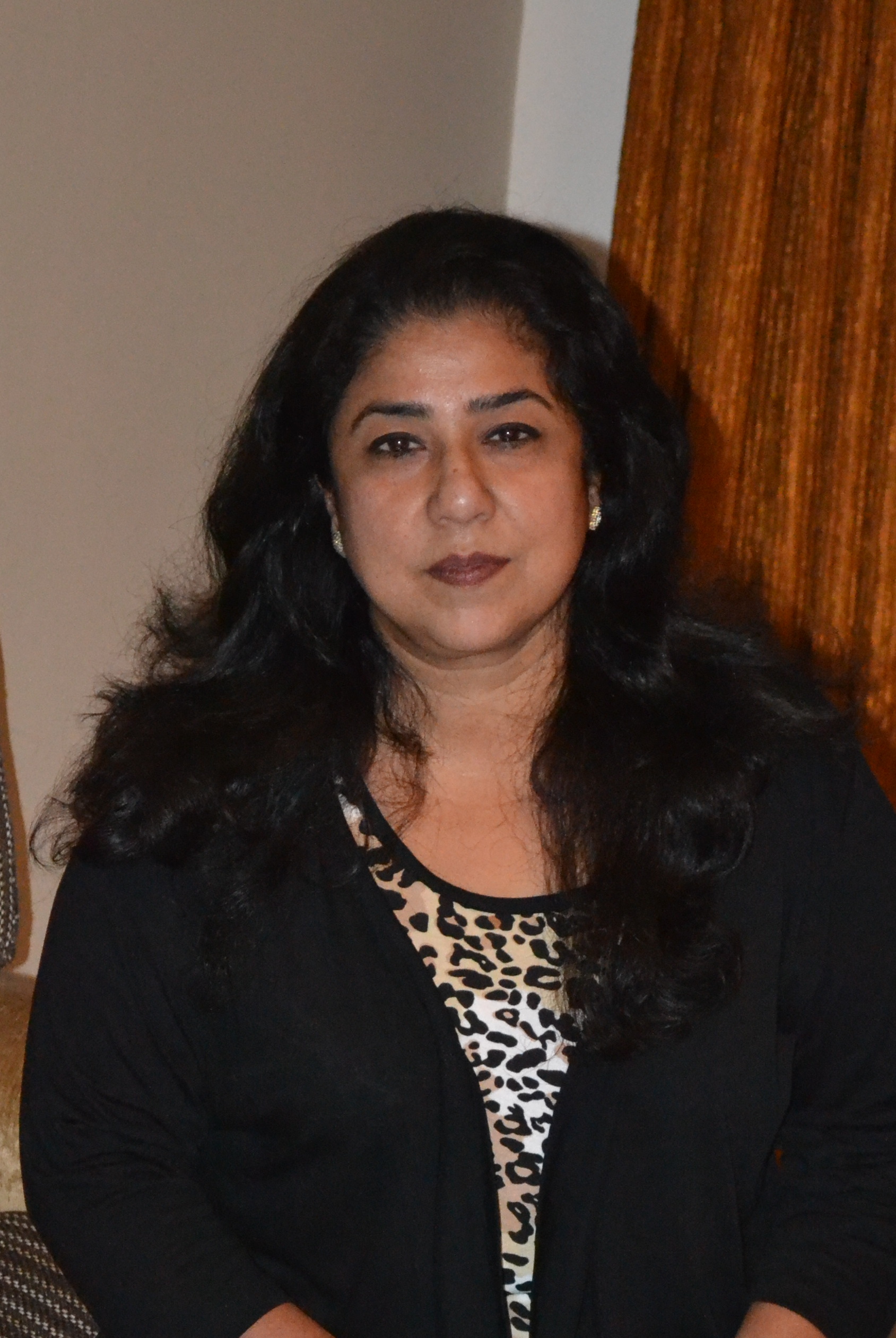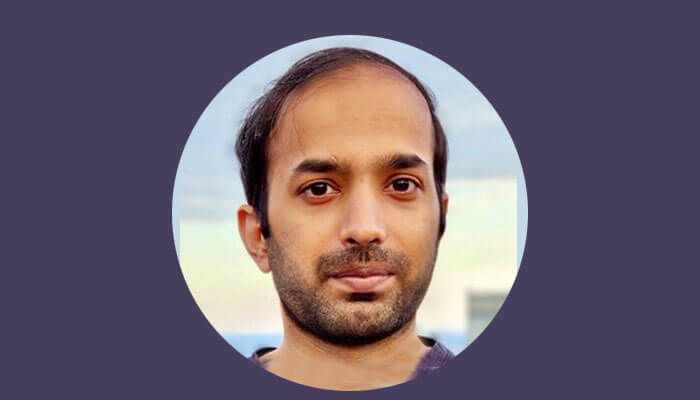It was definitely a SLAM dunk for IIITH alumnus Krishna Murthy Jatavallabhula, the young Robotics Engineer from Kakinada, who was recently awarded the prestigious NVIDIA fellowship for 2020-21. Currently, on the final stretch to completing his PhD at Mila, Université de Montréal, we caught up with Krishna at the Robotics and Embodied AI Lab to bat a few questions from us.
It was his submission on deeply intertwining “classical” approaches to computer vision and robotics with machine learning that caught the attention of NVIDIA, a company in the forefront of GPU computing. The NVIDIA fellowship is one of the 3 or 4 top scholarships on the American circuit. Incidentally, Krishna was also awarded the Google fellowship which he declined. Apart from comprehensive financial support and a high end GPU, the NVIDIA fellowship offers access to resources and talent at NVIDIA, and the opportunity to collaborate with the best in industry and academia.
Once in a Mila-nnium
It was during his final year of his Master’s program at IIITH in 2017, that Krishna travelled with Prof. Madhava Krishna to a top robotics conference at Singapore where his advisor connected him to colleagues who were hiring PhD students. “I had the pleasant dilemma of having to choose between 3-4 options”, he said. Mila, considered as one of the top 10 AI groups worldwide, is a non-profit lab forged together from 4 universities in Montréal – the Université de Montréal, McGill University, École Polytechnique and HEC. Being in the same building as some of the top technology companies like Facebook AI research, Google Deep Mind, Microsoft Research etc, Mila is recognized for making fundamental contributions to deep learning as we know it today. An interesting bit of trivia is that some of the best minds at Mila are IIITH alumni!
“I did a few courses with Prof C.V. Jawahar, Prof. Praveen Parachuri, Prof. Anoop M. Namboodiri and Prof Madhava Krishna”, remarked Krishna. It was one particular lecture by Prof. Madhava Krishna on SLAM (Simultaneous localization and mapping) that got the young man first intrigued. As he immersed himself into SLAM research and experimentation, he realized that it was a core tool in robotics, that had just the right interplay of linear algebra, graphics and probability theory. Today, a lot of Krishna’s work centers around 3D reconstruction, scene understanding, autonomous driving and SLAM. ” I want to design algorithms to make robots carry out meaningful tasks in the real world, for instance, having a robot run all my errands.” For this, the robot has to perceive the world around it, predominantly from images; either from a camera mounted on outdoor robots, like self-driving cars or other static locations. Perception is the first step to executing any other action and that is what I am focusing on”.
Deep learning Research Intern at NVIDIA
Krishna’s first industry internship was a four-month stint at NVIDIA in 2019 that was destined to garner a lot of attention. “During my time there, I worked on developing software that enabled researchers to implement research code in just a matter of days, drastically bringing down the time from the several weeks it took them earlier. A lot of experts would find the resources and time to help me out and the result was this huge framework called the NVIDIA Kaolin library”. https://developer.nvidia.com/nvidia-kaolin
Charmed journey from Kakinada to Mila
Krishna hails from a family in Kakinada that gave the world four generations of Ayurvedic and MBBS doctors. His father being an Ayurvedic CGHS doctor meant that his schooling was across India; from primary schooling in Chennai, high school in Delhi and Chandigarh and rounding off with his intermediate education in Kakinada.
Challenges and failures have always spurred Krishna on. He recalls that he hated Math in high school and couldn’t even comprehend the basic symbols. During his 10th standard holidays, he picked up a 6th grade Math text book and that’s when the Math bug got him good and proper, and the rest is history.
BITS Pilani had a strong robotics culture and Krishna led the Robocon team. As Captain of the club, he spent all his time at BITS, to build up a team and raise funds by organizing robotics workshops on campus and in rural institutions around Rajasthan, with his friend Gaurav. “I was so obsessed with robotics that I didn’t really pay attention to academics and that came back to hurt me later on and I ended up with a very low GPA”, says Krishna.

Buzzing laboratory and Thyagaraja’s Kritis – soul food for the Robotic mind
It was on the suggestion of his professors at BITS Pilani, who had worked closely with Prof Madhava Krishna, that Krishna applied to and got accepted into the master’s program at IIITH. The Lab in those days was abuzz with excitement, with students from different batches, working on different aspects of robotics. “There was an interactive culture of constant cross learning that I haven’t seen anywhere else. One week before the deadline was fun, since all of us would be pulling all-nighters and then would go out for breakfast together, before crashing in our rooms”.
At the tender age of 7, Krishna started his formal training in Carnatic music that continues to this day. While at BITS Pilani, he started training students to sing the Pancharatna Kritis of Thyagaraja. Life at IIITH was divided between classes, robotic research and learning music under his Guru Violin Vasu; even helping his guru in organizing music concerts like the prestigious Hyderabad Thyagaraja Aradhana.
Awards and Honors sweeten the ride
The RSS Pioneer 2020 Award came at the right time for the young roboticist who now had the opportunity to network with his top 30 peers in robotics research. The Best Paper Award that his team received from the Robotics and Automation Letters 2020 was the result of a collaborative project with a group from MIT. “We designed the perception algorithms for an autonomous car, to drive 10 kms in a test driving site in rural Massachusetts, using a simple topological 2d version of a google map. We actually had three authors from IIITH in it!”

Krishna sets time aside to mentor underrepresented groups who reach out to him. Most of his mentees are graduate school applicants and a non-trivial fraction of them hail from the African continent. To streamline his mentorship efforts, Krishna has created a google form that has made it easier for students to interact with him”. (https://docs.google.com/forms/d/e/1FAIpQLSc5F-ZuxaeJn6W4oQKDvuItXE7OuV2s0s0vZXE1QB5EzizbwQ/viewform?usp=sf_link)
The days of the Pandemic went off smoothly for Krishna, thanks to the company of his wife who kept him grounded. Between honing his culinary skills, weekly Carnatic music classes with his Guru D. Balakrishna from Chikmagalur via skype and his research, Krishna has it all balanced. About his future plans, Krishna has this to say, “I don’t know where I will be in 2-3 years but if I return to India, I will definitely apply for a position at IIITH”.



Next post